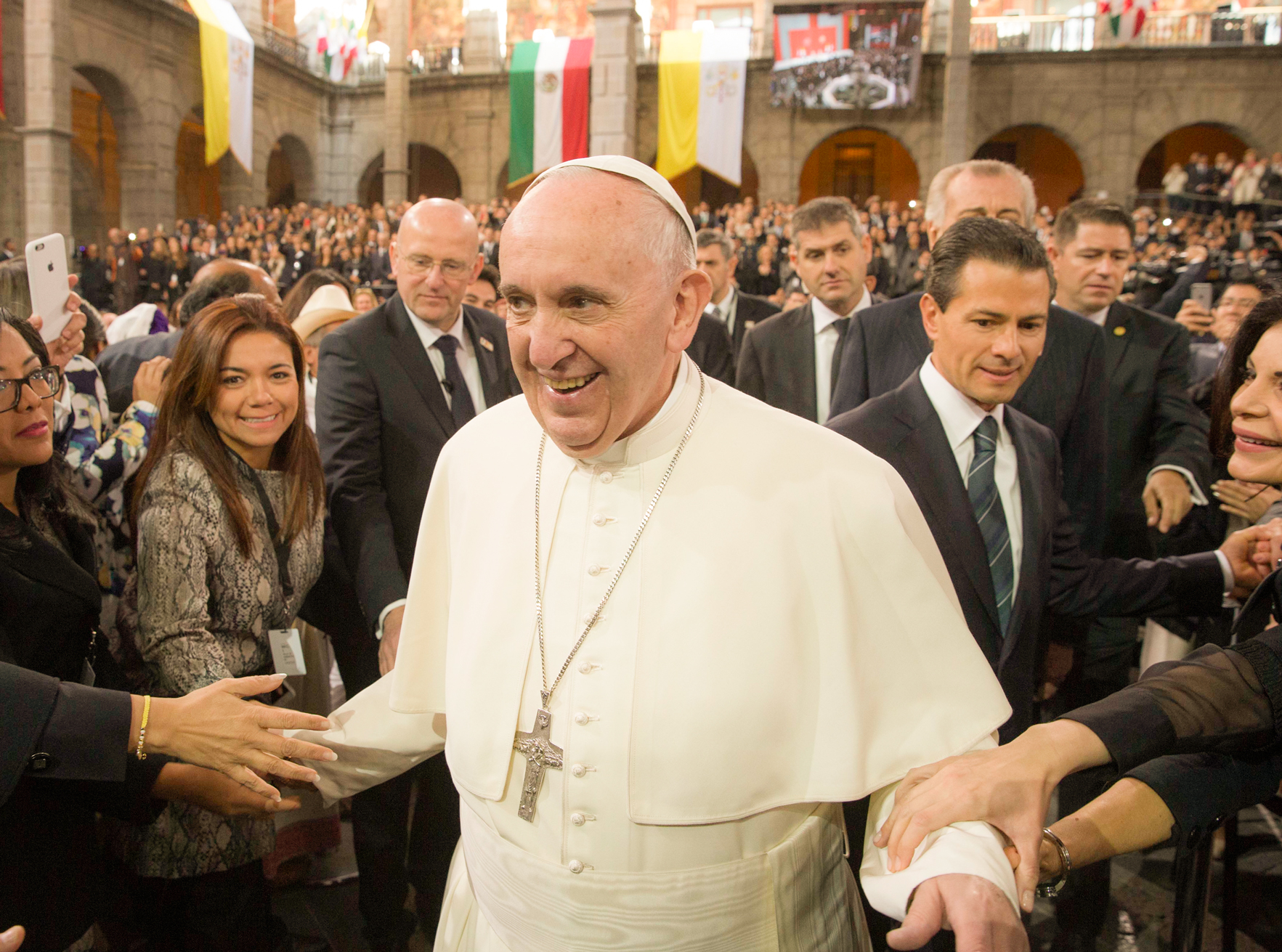
Much of the commentary about Pope Francis’s encyclical Laudato Si’, both before and after its release, has focused on the controversial issue of climate change. My instinct, however, is that in the long run its incorporation of Darwinian evolution into its teaching on Catholic anthropology will end up being equally, if not more, significant. Francis’s predecessors Popes John Paul II and Benedict XVI recognized the scientific truth of evolution, but never brought this science into dialogue with their teaching on the human person. Francis, by contrast, has begun this dialogue, even if tentatively and incompletely.
On October 22, 1996, Pope John Paul II presented an address to the Pontifical Academy of Sciences in which he recognized the scientific validity of the theory of evolution. In July of 2007, in some informal remarks Pope Benedict XVI argued that seeing evolution and belief in God as exclusive alternatives is an “absurdity,” rejecting both creationism and materialistic versions of evolutionary theory. Both popes were concerned with questions of randomness, order, and design—for example Benedict’s rejection of the idea that humankind is “merely a random product of evolution in some place on the margins of the universe” in his 2011 Easter homily—yet both affirmed that evolution could be understood as part of a theistic design for the cosmos.
To my knowledge, however, neither John Paul II nor Benedict XVI ever addressed evolution in a positive way in their more formal teaching documents, nor did they bring evolutionary theory into dialogue with Catholic theological anthropology. Both gave central importance to Genesis 1-3 as a source for anthropology, but both read it in ways unmarked by any awareness of evolution. This is even true when they are speaking about humankind’s relationship to the natural environment. For example, in his most extensive statement on the environment, his 1990 World Day of Peace Message, Pope John Paul II appeals to Genesis 2 to justify humankind’s stewardship of nature, but there is no sense that humanity evolved from the natural world over which it has stewardship. The same is also true of Benedict’s 2010 World Day of Peace Message, where he also contrasts the Genesis account of creation with the view that the world is the product of “necessity,” “blind fate or chance,” without mentioning his own earlier more nuanced views on evolution.
Like his predecessors Francis has affirmed evolution, but unlike them, he has now woven evolutionary biology into his encyclical Laudato Si’. Early in the encyclical, he refers to “biological evolution” as one of the “complex systems” characteristic of the planet (#18). But what about human beings and their role in evolution? Probably the most important passage is paragraph #81:
Human beings, even if we postulate a process of evolution, also possess a uniqueness which cannot be fully explained by the evolution of other open systems. Each of us has his or her own personal identity and is capable of entering into dialogue with others and with God himself. Our capacity to reason, to develop arguments, to be inventive, to interpret reality and to create art, along with other not yet discovered capacities, are signs of a uniqueness which transcends the spheres of physics and biology. The sheer novelty involved in the emergence of a personal being within a material universe presupposes a direct action of God and a particular call to life and to relationship on the part of a ‘Thou’ who addresses himself to another ‘thou’. The biblical accounts of creation invite us to see each human being as a subject who can never be reduced to the status of an object.
Although the thrust seems to be the other way, this passage makes clear that humanity also emerged through evolution. We are hampered by a misleading English translation of the first line, which in the original Italian reads “L’essere umano, benché supponga anche processi evolutivi, comporta una novità non pienamente spiegabile dall’evoluzione di altri sistemi aperti,” which is better translated as “The human being, even if one supposes evolutionary processes, entails a novelty not fully explicable by the evolution of other open systems,” or “Even if the human being (pre)supposes evolutionary processes, it entails….” This latter version mirrors the French translation: “Bien que l’être humain suppose aussi des processus évolutifs, il implique une nouveauté qui n’est pas complètement explicable par l’évolution d’autres systèmes ouverts.” The English translation evokes a tentativeness that is not present in the other versions.
Later in the encyclical, Francis writes: “Nature cannot be regarded as something separate from ourselves or as a mere setting in which we live. We are part of nature, included in it and thus in constant interaction with it” (#139). Although Francis could be clearer in bringing this out, the implication of this statement is again that not only did humankind emerge from the process of biological evolution, but like other organisms continue to exist in an adaptive (or maladpative) relationship with the physical environment.
Although Francis does not make the connections for us, linking different passages from the encyclical can create results that are quite startling. For example, in paragraph #99 he points out that when the Word “became flesh,” He “entered into the created cosmos,” but as we have seen, this is the cosmos of evolution. When the Word became flesh, this flesh carried the evolutionary history of countless organisms!
What makes Francis’s comments on evolution more remarkable is that they take place in a document a major theme of which is to critique the reductive, soulless, materialist tendencies of modern science which had led John Paul II and Benedict XVI to speak cautiously about the theory of evolution. Francis writes that a mentality drawn exclusively from the scientific method leaves humanity “in the presence of something formless, completely open to manipulation,” in a “confrontational” relationship with the natural world (#106) Passages such as this have even led R.R. Reno, the editor of First Things, to propose that Francis is anti-science. But Francis is rejecting the “one-dimensional paradigm” of reductive science as our only way of relating to the natural world. Now I think his main thrust is that we also need a spiritual way of relating to nature (e.g., #76), but, consistent with Francis’s goal of “seeing the mysterious network of relations between things” (#20), even the science he draws on in the encyclical pushes against reductionism.
Throughout the encyclical, Francis draws on the science of ecology, which in its very method takes a more holistic approach than that dominant in modern science. Based on some of the technical terms used in the encyclical—“open systems,” “complex systems,” “emergence”—and more common but related terms—“connectivity,” “complexity”—I think it is possible that Francis is drawing specifically on systems ecology, the branch of ecology that deals with ecosystems as systems. This means instead of breaking natural phenomena down into their parts, one looks at the system as a whole, how its parts work together in ways that might transcend the sum of the parts. Ecology presupposes evolution, but also helps explain the holistic context in which environmental shifts, adaptation, and natural selection occur. It also provides a wider context, making clear that biological evolution presupposes more basic natural processes: every ecosystem depends on the sun for energy, the consumption of one organism by another occurs through chemical processes, etc.
We see this idea in Laudato Si’ in Francis’s use of the concept of the “open system.” Unfortunately again we are faced with a misleading translation—“In this universe, shaped by open and intercommunicating systems, we can discern countless forms of relationship and participation” (#79). In the original Italian, the first two clauses read “In questo universo, composto da sistemi aperti che entrano in comunicazione gli uni con gli altri”—that is, “In this universe, composed of open systems that enter into communication, one with another”—making clear that here we have a definition of an “open system,” not two types of systems. Closely linked with the idea of the “open system” is that of “emergence.” For example, one can speak of the emergence of a “higher” level of natural reality from a “lower” level, the lower remaining operative but the higher irreducible to the lower; an example would be the chemical processes necessary for the biological functioning of an organism. Or it can refer to the phenomenon of a whole greater than the sum of its parts, such as an organ composed of cells, or a flock of birds, its behavior irreducible to the characteristics of the birds considered individually. This term appears only a few times in the encyclical, such as the “emergence” of humankind from the material universe cited earlier, but the concept itself seems central to the document.
At the beginning I noted that Francis’s dialogue with evolutionary biology is tentative and incomplete, so let’s return to that central paragraph, #81. Here Francis shows a concern similar to that raised by Pope John Paul II in his address to the Pontifical Academy of Sciences, the uniqueness and spiritual dignity of the human person. As John Paul II stated:
. . . [I]f the human body takes its origin from pre-existent living matter, the spiritual soul is immediately created by God. Consequently, theories of evolution which, in accordance with the philosophies inspiring them, consider the mind as emerging from the forces of living matter, or as a mere epiphenomenon of this matter, are incompatible with the truth about man. Nor are they able to ground the dignity of the person.
Francis, like John Paul, seems to want to have it both ways: the human person emerges from the material universe, but is also dependent on a “direct action” of God. It seems to me that John Paul, and perhaps Francis following him, too easily collapses the two theories mentioned above. Surely we want to reject the idea that the mind or soul is an epiphenomenon of the body, reducible to biological processes, but it is not clear to me that considering consciousness as an emergent property of the material body, dependent on but irreducible to biological processes, diminishes human dignity in the same way. Thinking that God must “immediately” or “directly” intervene into the world to create each human soul seems to presuppose the empty, materialistic view of nature both popes want to reject. As Francis notes throughout his encyclical, the natural world is already alive with the presence of God—“The Spirit of God has filled the universe with possibilities and therefore, from the very heart of things, something new can always emerge” (#80).
Likewise, as a biologist friend reminded me, all of the things Francis lists as unique to humankind—“Our capacity to reason, to develop arguments, to be inventive, to interpret reality and to create art”—can be found to some degree in other animals. Even if humans are quantitatively, or even qualitatively, different from other animals, it is still important to keep in mind that at least some animals have a reflective or even spiritual capacity, a fact that Francis recognizes elsewhere in the encyclical (e.g., #72).
But perhaps Francis offers a different way of thinking about this problem after all. For one, in paragraph #81, Francis claims that human uniqueness “cannot be fully explained” by evolution, suggesting that in part it can. Human reflective and spiritual capacities have some evolutionary basis. Second, even though he refers to the “direct action of God,” Francis does not actually raise the issue of “ensoulment.” Perhaps the “direct action” referred to here is not the creation of the soul, but grace, the invitation to participate in Trinitarian love. In one of the most theologically pregnant lines of the encyclical, immediately following the above cited definition of “open systems,” he writes that we should think of “the whole as open to God’s transcendence, within which it develops”; the created universe is not only immanently open, through the emergence of new and more complex “open systems,” but also transcendentally open to the divine, an openness only fully realized in the human person. This idea is confirmed a bit later:
. . . [A]ll creatures are moving forward with us and through us towards a common point of arrival, which is God, in that transcendent fullness where the risen Christ embraces and illumines all things. Human beings, endowed with intelligence and love, and drawn by the fullness of Christ, are called to lead all creatures back to their Creator (#83).
Unlike other forms of emergence, the invitation to Trinitarian love through Christ is experienced as coming from beyond our own innate capacities. And since this invitation is there from the beginning (the human person having no “pure nature”), then it is indeed true that the human capacity for reflection, inventiveness, and beauty is always shaped by grace, even if it is also partly a product of evolution.
Even if tentative and incomplete, in Laudato Si’ Francis provides us a more positive way of integrating evolutionary biology and Catholic anthropology than his predecessors. Some important topics are not even addressed: the question of suffering and death, the doctrine of original sin, ethical questions about “natural law,” selfishness, cooperation, and altruism. As the above reflections show, however, Francis has planted theological seeds that need tending in the years to come.






Thank you for this post! I agree with your assessment that this is a helpful step forward, even if incomplete. I’ve been reading Elizabeth Johnson’s Ask the Beasts: Darwin and the God of Life (2014) and John Haught’s Making Sense of Evolution: Darwin, God, and the Drama of Life (2010) and I am more and more convinced by the compatibility of Christian faith and evolutionary biology. But there are still so many questions, both scientific and theological, that remain to be explored. One of the things I most appreciate about the encyclical is the spirituality of attentiveness. To walk in the mountains, or sit beside the river, or watch an ant crawl over your paper plate at a picnic– to simply recognize the beauty of creation and respond in awe and wonder– that is a wonderful first step for both scientists and theologians.I think it is really interesting that he interprets Jesus as an exemplar here: “Jesus taught us this attitude when he invited us to contemplate the lilies of the field and the birds of the air, .. He was completely present to everyone and everything, and in this way he showed us the way to overcome that unhealthy anxiety which makes us superficial, aggressive, and compulsive consumers.” (226)